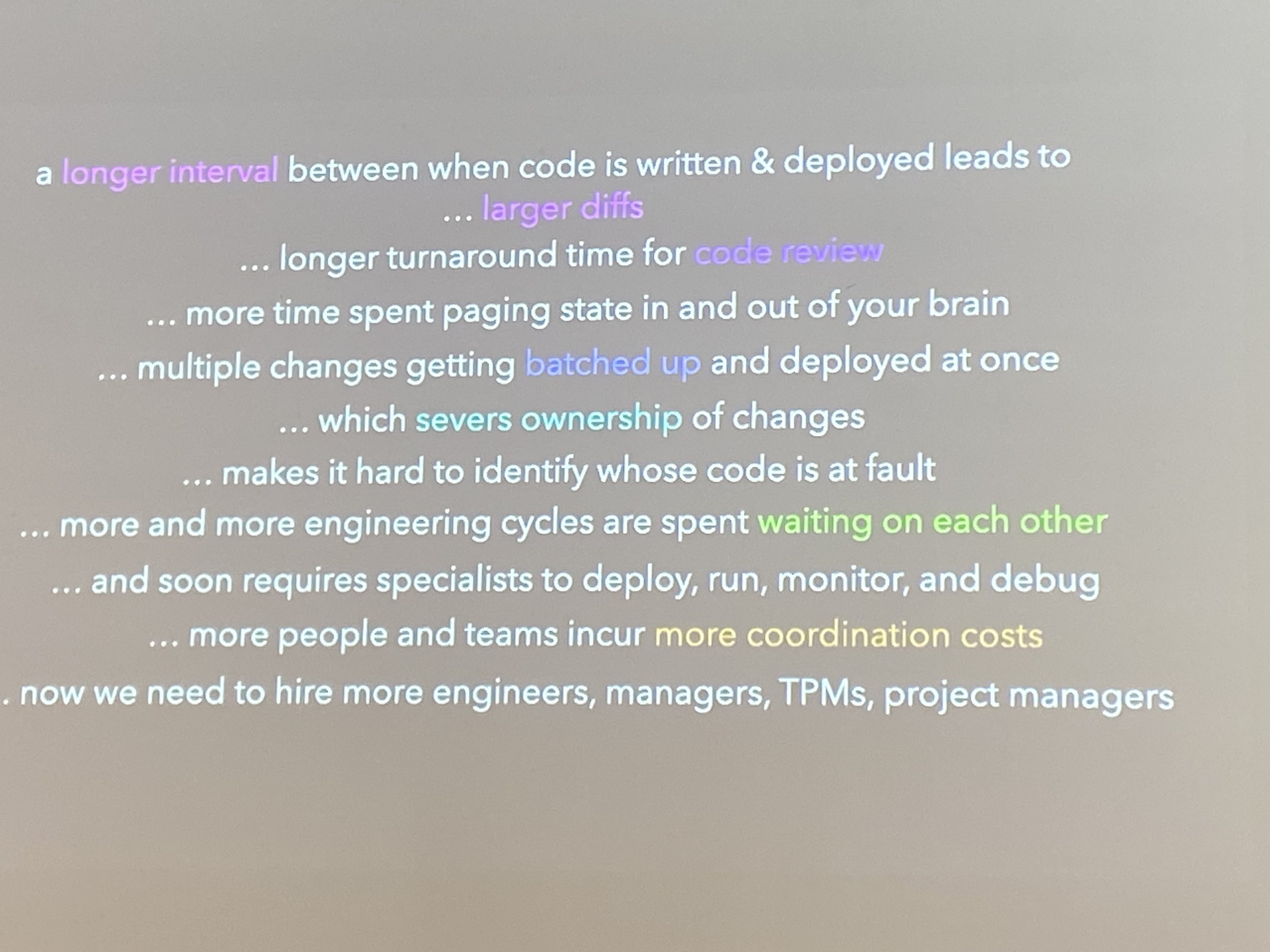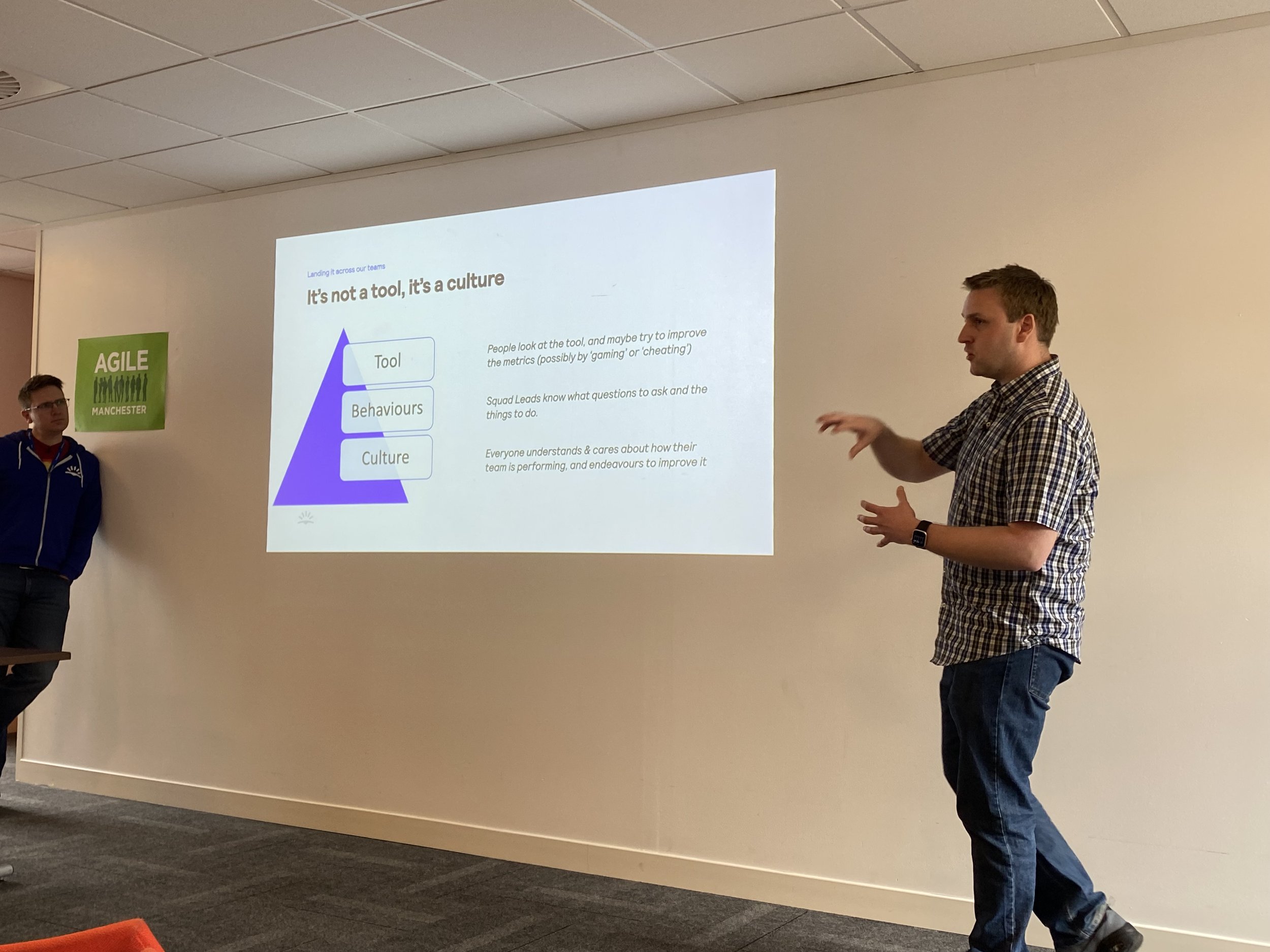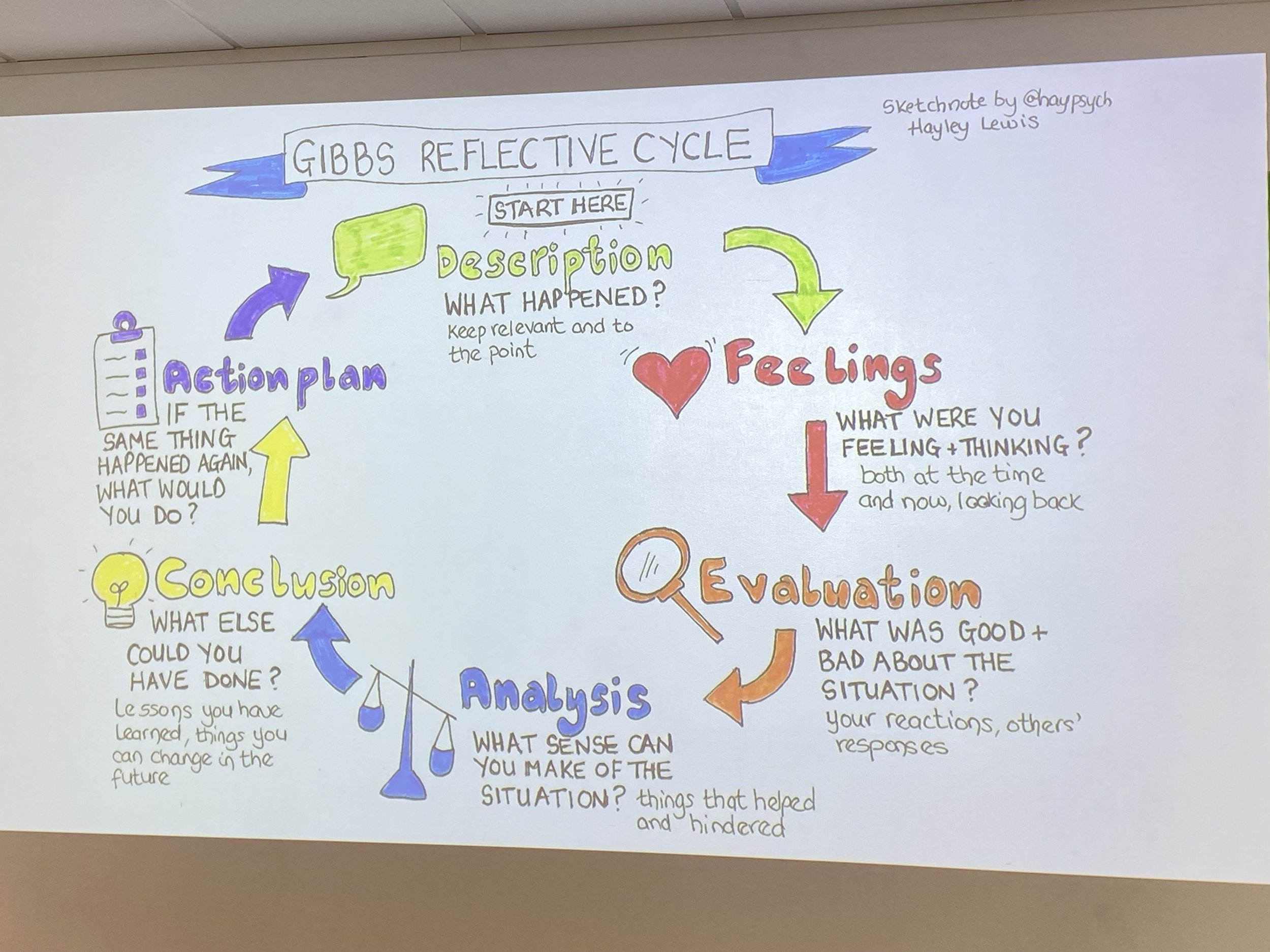Social and technical practices for fast flow - insights from Agile Manchester 2023
Introduction
My colleague, Matthew Skelton (co-author of the book Team Topologies) gave the opening keynote at this year’s Agile Manchester conference and the theme that he explored in his talk was ‘social and technical practices for fast flow’. I was fortunate to be able to attend all 3 days of the conference and in this article I share my key takeaways from some of the sessions that I attended.
Audience at Agile Cambridge 2023 with speaker Annette Joseph MBE
Key takeaways
It’s not social, or technical, but sociotechnical that matters
The subtitle of Matthew’s talk was ‘Social and technical practices for fast flow’ but what really struck me as I sat and listened to many of the talks, including Matthew’s, was that it’s actually the sociotechnical aspects of delivering and operating software that are the most crucial, that the social and the technical cannot be easily separated.
This was apparent even in Matthew’s opening keynote when talking about deployment pipelines and how often they mirror the team structure in an organization. “Show me your deployment pipelines and I will predict your team boundaries.”
Continuous everything
Four of the talks on the conference program had the word ‘continuous’ in the title. This isn’t just about continuous integration, or continuous delivery: it’s continuous everything. Continuous integration, deployment, testing, monitoring, scanning, right-sizing, user research. It’s about testing our work, testing our understanding, always looking to get fast feedback. It’s a continuous cycle of doing and learning, doing and learning.
Again, this is where sociotechnical comes into play. It’s the tools - the technical - that enable us to learn, improve, and work together more effectively - the social.
We need to enable everybody to contribute
When individuals come together to work in teams and teams of teams - in organizations - we are greater than the sum of our parts and create things together that wouldn’t be possible working on our own.
As individuals, each one of us has different skills, experience, perspectives, and capabilities. We enable our teams and our organizations to be more effective when we recognise that people are not interchangeable and fungible resources. Multidisciplinary teams that make the most of people’s different skills and experiences are able to create better solutions to problems. They are also able to work without hand-offs, improving flow.
The system of work needs care too
You need to pay attention to the system of work itself, “the system that builds systems” as Andy Longshaw, one of the organizers of Agile Manchester described it almost in passing as he introduced Matthew on the first morning.
This has to be done deliberately, with intent, and it has to have the support and encouragement of senior leadership so that people know that it’s ok to spend their time and energy on such work. Organizationally, you reap what you sow.
This can be in a positive or a negative way. Charity Majors described the negative impacts that can result from not investing in continuous delivery: what she called the software development ‘death spiral’. Jack Collier, on the other hand, described the incredible results that can be achieved when we strive to be intentional about our organizational processes and structures. When we work to keep them as lean as possible, to hit that sweet spot where they provide the support that people need without getting in the way.
Summaries of sessions
I’ll now give summaries of the sessions that I attended.
Matthew Skelton: Continuous delivery at scale - social and technical practices for fast flow
Matthew Skelton at Agile Manchester 2023 - photo by Andy Norton
Matthew opened the conference with a talk about the technical and social practices that are needed to achieve continuous delivery at scale. He used a case study from work he had done at the UK Home Office back in 2018 to illustrate some of the problems that organizations often face, and some of the social and technical practices he introduced to improve flow.
These include technical practices such as an overhaul of logging across applications to ensure consistency, and breaking up the previously monolithic build pipeline so that individual services could be built, tested, and deployed independently. Social practices included setting up an Engineering Guild and Engineering Working Group to help share knowledge and learning across the organization.
As noted in my key takeaways, what struck me during Matthew’s talk is that what really matters is the sociotechnical. Application logging is a technical practice - but it matters because of the “operator experience” of the person on the sharp end of that logging when dealing with incidents. Enabling a team to build and deploy its service independently of others enables that team to move faster, deliver value more often and more quickly.
What is fast flow?
Fast flow is multiple ongoing streams of changes to software-enriched services done safely and sustainably.
Conflux can help your organization adopt fast flow.
Charity Majors: It is time to fulfill the promise of continuous delivery
Charity Majors, founder and CEO of Honeycomb.io, gave the closing keynote on the first day with a talk about continuous delivery and the benefits it delivers, not just to organizations, but also to individuals.
She referenced the State of DevOps reports and in particular the difference between teams who are regarded as high-performing and those who are not. High-performing teams spend their time solving problems that move the business forward. Lower-performing teams spend their time doing things like fire-fighting, fixing flaky code, fighting with infrastructure etc.
In her usual inimitable style, Charity put the case for continuous delivery quite bluntly. She asked the question, ‘How much is your fear of continuous delivery costing your organization?’. She also noted that, because this is a quality of life issue for your engineers, this is an ethical issue for your organization.
Laz Allen & Ramsay Asby: Continuous improvement by the numbers and the culture
Laz Allen and Ramsay Ashby, from Skyscanner, gave an account of how they introduced engineering productivity metrics across teams in their Product Engineering organization.
They described their journey from first identifying the need for teams (and the wider organization) to be able to identify bottlenecks and waste in the system, to how they have scaled this across multiple teams in multiple locations. Along the way, they had to pick which tool they would use, determine which metrics they would focus on and measure, and engage with team leads to onboard them into the program.
It could be argued that this is the ultimate sociotechnical practice for creating fast flow. Using a tool that helps teams see and better understand how they are working, see where blockers to flow are, and help them to create experiments to improve it.
Emily Webber: Why can’t we all just get along
Emily Webber is an independent agile consultant and author, who also runs the ‘Agile in the Ether’ meetup which was running in a virtual way long before any of us had even heard the word ‘Covid’. Her talk was on the topic of capabilities and cross-functional teams.
Emily began by describing three anti-patterns for how teams are often structured in technology organizations: one role across many teams, Product vs Engineering wars, and the X-led organization. She also described some of the problems these patterns cause: one group holds all the power, they reinforce ‘professional protectionism’, and they cause in-team silos.
She then went on to describe three patterns for creating better teams and organizations. First, create enabling organizational structures by having cross-functional teams at every level of an organization, not just at the bottom individual contributor level. Second, build truly multi-disciplinary teams that include all the disciplines and capabilities that the team needs to deliver value - not just engineering roles - such as legal and marketing. Third, purposefully overlap as a team: recognise that people are not interchangeable and recognise what each person brings to a team.
Hayley Lewis: Psychological safety - how to boost creativity and increase collaboration
Dr Hayley Lewis is a psychologist and coach, lecturer, speaker and creator of awesome sketch-notes. She gave the keynote on the second day, with a talk about psychological safety and how it helps to boost creativity and increase collaboration.
This was a very practical keynote, with Hayley giving details of different resources, techniques, and frameworks that can be used to help teams and organizations to communicate more clearly with each other, connect more, and make better decisions. These included Dr Amy Edmondson’s ‘Leaders Toolkit’ to create psychological safety outlined in her book The Fearless Organization, Gibbs’ Reflective Cycle - shown below in one of Hayley’s amazing sketch-notes, and using The Devil’s Advocate technique which is when a member of the team is given explicit permission to deliberately ask important but awkward questions which otherwise might not be voiced.
Lianne Mellor & Nikola Goger: BFFs and rocket ships
Lianne and Nikola both work for the Ministry of Justice; Lianne is Head of Delivery Management and Nikola is Head of Design. Their talk, with its rather enigmatic title, was about an initiative they have undertaken to get people working together - across the organization - on cross-cutting projects to improve how the organization itself works. These projects are the ‘rocket ships’.
Lianne and Nikola began by describing how the inevitable organizational silos and focus on delivery is generally an impediment to making any changes to improve the system of work itself. Even where there are ideas for ways to make improvements, these are also confined to silos where any impact will be limited, and effort will be wasted because of duplication and overlap. They realized they needed to work together - across their disciplines - and so ‘Rocket Ships’ came into being!
What struck me most was the amount of investment that was clearly being put into this initiative by the organization: process, documentation, guidelines, Miro templates. Even though Lianne and Nikola said that, to some extent, they were describing a future destination, not where they currently are today.
Jack Collier: 7 days of agile - what we learned delivering COVID testing to schools
Jack’s talk was an account of how the Department for Education (DfE) successfully delivered Covid testing to all secondary schools across England in just 7 days in December 2020, at the height of the Covid pandemic.
On 15th December, the DfE was told of the plan to test students in all English secondary schools for Covid twice a week when schools returned after the Christmas break. Jack and his colleagues had until the 4th of January to design and deliver a platform that would enable schools to upload test results (and which had to integrate with NHS systems), register schools on the platform, and train teaching staff how to use it.
Astonishingly, they succeeded, and Jack described how they did so through what he called ‘the power of small things’.
These ‘small things’ included such things as:
Allowing people to self-organize into teams as people know best where and how to work
Using common language as this helps to create shared mental models
Using data - both quantitative and qualitative - to make great decisions
Leaders leading by example - being vulnerable and creating space for others to show their feelings
Summary
If I had to summarize all my insights from Agile Manchester into just a single takeaway, it would be this: that in order to achieve fast flow, we need to remember that the organizations in which we work are sociotechnical systems in themselves. The ‘systems that build systems’. We need to take the time, and make the effort, to care for these systems as they are the mechanism by which we do our work and deliver value to our customers.





